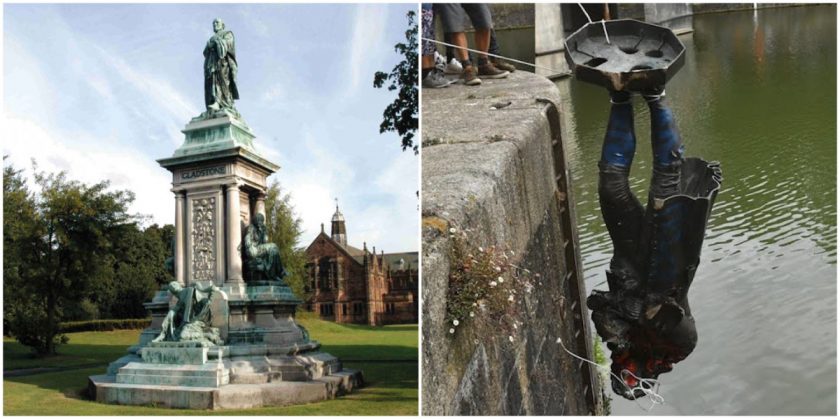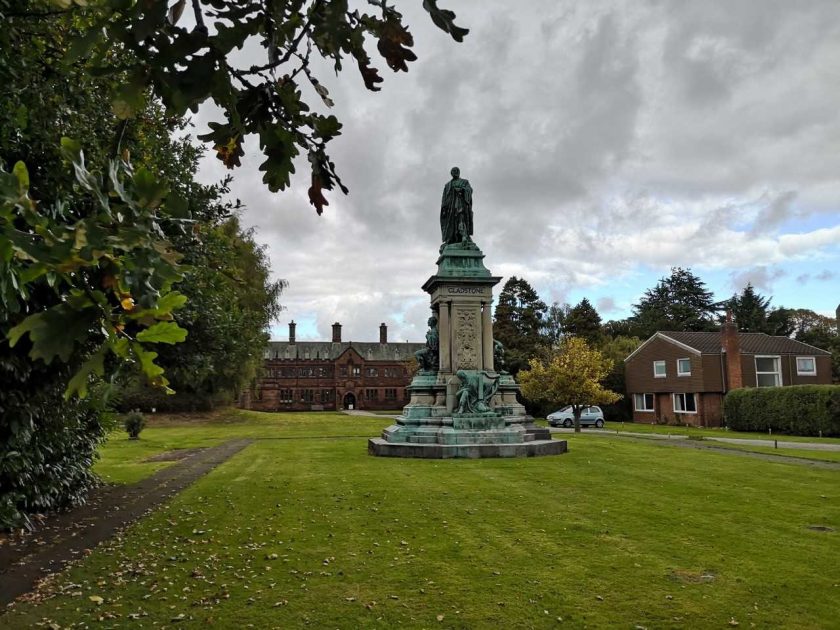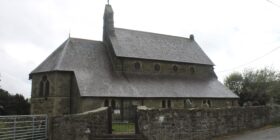A statue of William Gladstone in Hawarden appears on anti-racism activists ‘hit list’ of monuments they want taking down

Statues of William Gladstone could be taken down from a Flintshire library dedicated to the former British prime minister in the wake of the Black Lives Matter protests.
The Warden of Gladstone’s Library in Hawarden said the institution would not ‘stand in the way’ if it was the ‘democratic will’ to remove statues of its founder.
Black Lives Matter supporters are calling for the removal of statues and memorials in the United Kingdom which “celebrate racism and slavery”.
A large statue of William Gladstone situated in the grounds of the library is one of around 60 across Britain to appear on crowdsourced map titled “Topple the racists.”
The “Topple the Racists” movement follows the forced removal a statue depicting slave trader Edward Colston in Bristol [pictured top right]
Colston’s statue was pulled down and thrown into a river on Sunday during a Black Lives Protest.
The map entry for Gladstone’s statute states there is a “large blue statue of Prime Minister William Gladstone in the grounds of Gladstone’s Library, in a prominent position in the centre of Hawarden village”
It goes on to say: “In William Gladstone’s maiden speech to Parliament, he defended slavery.”
“He fought for compensation for slave owners. His father, John Gladstone, received the largest compensation payment of anyone in the UK, suggesting he owned the most slaves in the country at the time of abolition.”
Yesterday Liverpool University revealed it is renaming a halls of residence that bears the name of the four-time prime minister after students wrote a letter to its Vice-Chancellor, Dame Janet Beer.
In the letter, they wrote: “We can not facilitate normalising people like William Gladstone by naming our campus after them.”

Peter Francis, who has been Warden of Gladstone’s Library since 1997 issued a statement today, he said: “At the core of our being, we at Gladstone’s Library believe that Black Lives Matter.
We also believe that if it is the democratic will, after due process, to remove statues of the founder we would not stand in the way. Nor, I think, would William Gladstone.
What matters is how we live today: our values, our democratic process and political involvement.”
Mr Francis said William Gladstone’s politics were “strikingly different to his Tory father’s politics and values.”
Gladstone was the first British politician to “lead a left-leaning government and to institute dramatic democratic changes when he introduced the secret ballot, universal education and a foreign policy based on freedom and liberty and not the aggrandisement of Empire.”
Mr Francis, who is in charge of the day-to-day running of the library said: “Gladstone’s Library, and I should add the Gladstone family, have continued to uphold and promote those liberal values.
As a Library we are building our programme around the Gladstonian themes of democracy, human rights and freedom of belief – and we do not mean by simply looking back at history but by reading ‘the signs of the times’ and working for a more democratic, humane and tolerant society.
The Library aware of John Gladstone’s plantation owning past has instituted a scholarship for research into historical and contemporary slavery.”
Mr Francis said: “William Gladstone’s record of public office was one of almost unequalled service. He was the driving force behind the emergence of the Liberal party, he was a humanitarian, one could even celebrate him as one of the founders of the modern concept of human rights. He was passionate about education for all rather than just the elite.
He was quick to defend the oppressed whether in Italy, Ireland, Bulgaria or Armenia. It is a career that is worth celebrating but we memorialise it best by being politically involved, humane and tolerant.”
Mr Francis said it is “undeniable that William Ewart Gladstone’s father, John Gladstone, in common with many successful British merchants in the early nineteenth century, owned land in the West Indies and South America that used slave-labour.”
John Gladstone received £106,769 in compensation at the time of the abolition of slavery.
“William himself received nothing. Yes, in 1831 William did speak in the Commons in favour of compensation for slave owners. It was his first speech in the Commons and he was still in thrall to his father.” Said Mr Francis.
Towards the end of his life William Gladston cited the abolition of slavery as “one of the great political issues in which the masses had been right and the classes had been wrong.
He thought it was a taint on national history and politics.”
“Liberty today means countering racism, sexism and intolerance wherever we see it. That is where our energy should be exerted.” Added Mr Francis.
Spotted something? Got a story? Send a Facebook Message | A direct message on Twitter | Email: [email protected]Latest News









